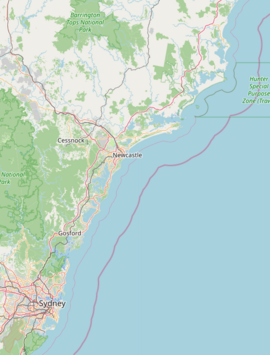Awaba, New South Wales facts for kids
Quick facts for kids AwabaGreater Newcastle, New South Wales |
|||||||||||||||
|---|---|---|---|---|---|---|---|---|---|---|---|---|---|---|---|
| Population | 430 (2021 census) | ||||||||||||||
| Established | 1885 | ||||||||||||||
| Postcode(s) | 2283 | ||||||||||||||
| Elevation | 33 m (108 ft) | ||||||||||||||
| Location |
|
||||||||||||||
| LGA(s) | City of Lake Macquarie | ||||||||||||||
| Parish | Awaba | ||||||||||||||
| State electorate(s) | Lake Macquarie | ||||||||||||||
| Federal Division(s) | Hunter | ||||||||||||||
|
|||||||||||||||
Awaba (/əwɒbə/) is a town and locality in the City of Lake Macquarie, Greater Newcastle in New South Wales, Australia. It is located inland from Toronto. The name Awaba comes from an Aboriginal word. It means "flat or plain surface," which refers to Lake Macquarie.
Contents
Awaba's Story
This section tells you about the history of Awaba and the important places there.
First People
The first people to live in this area were the Awabakal Aboriginal people. They have lived on this land for a very long time.
How Awaba Got Its Name
The name "Awaba" is an Aboriginal word. It means "flat or plain surface," which was the Aboriginal name for Lake Macquarie.
Early Land Owners
One of the first big land grants was given to Mr. W.A. Kingscote. He owned a large property of 1,100 acres in the Awaba Parish.
Town Planning
The first official plan for the town was approved on August 20, 1891. At first, the streets didn't have names. In 1892, the first street names were added. These included Barton Street, Melbourne Street, Brisbane Street, Gosford Street, Nellinda Street, Heaton Street, and Adelaide Street.
First Families
The first people to settle in Awaba were mostly timber workers. They came from nearby places like Mulbring and Mount Vincent. Families like the Field, Wellard, Puddy, and Murrell families were among the pioneers.
Early Jobs and Industries
In 1885, a timber depot was set up in Awaba. This was a place where cut timber was stored. In the same year, Awaba was chosen as a site for building the railway. A large sawmill, which cuts logs into planks, was an important part of the town early on. Later, in 1948, the Awaba State Coal Mine was opened. This happened thanks to J.M. Baddeley, who was a government minister during the war.
The Railway
The railway station in Awaba opened in 1887. It had a platform for trains and a side track for other trains to wait. A special railway line from Awaba to the Wangi Wangi Power Station opened in 1954. This line was about 6.5 miles long, but it is not used anymore.
First Post Office and School
Awaba's first Post Office opened on October 1, 1889. This allowed people to send and receive mail. The first public school in Awaba opened in June 1891. This was an important step for children in the growing town to get an education.
Town Life
The village of Awaba grew because of the railway workers. Their homes were spread out across the area. Early settlers also opened small shops. One person ran a general store, and another had a simple butcher's shop. The town was officially created in 1885, the same year the timber depot was established.
 | Anna J. Cooper |
 | Mary McLeod Bethune |
 | Lillie Mae Bradford |


